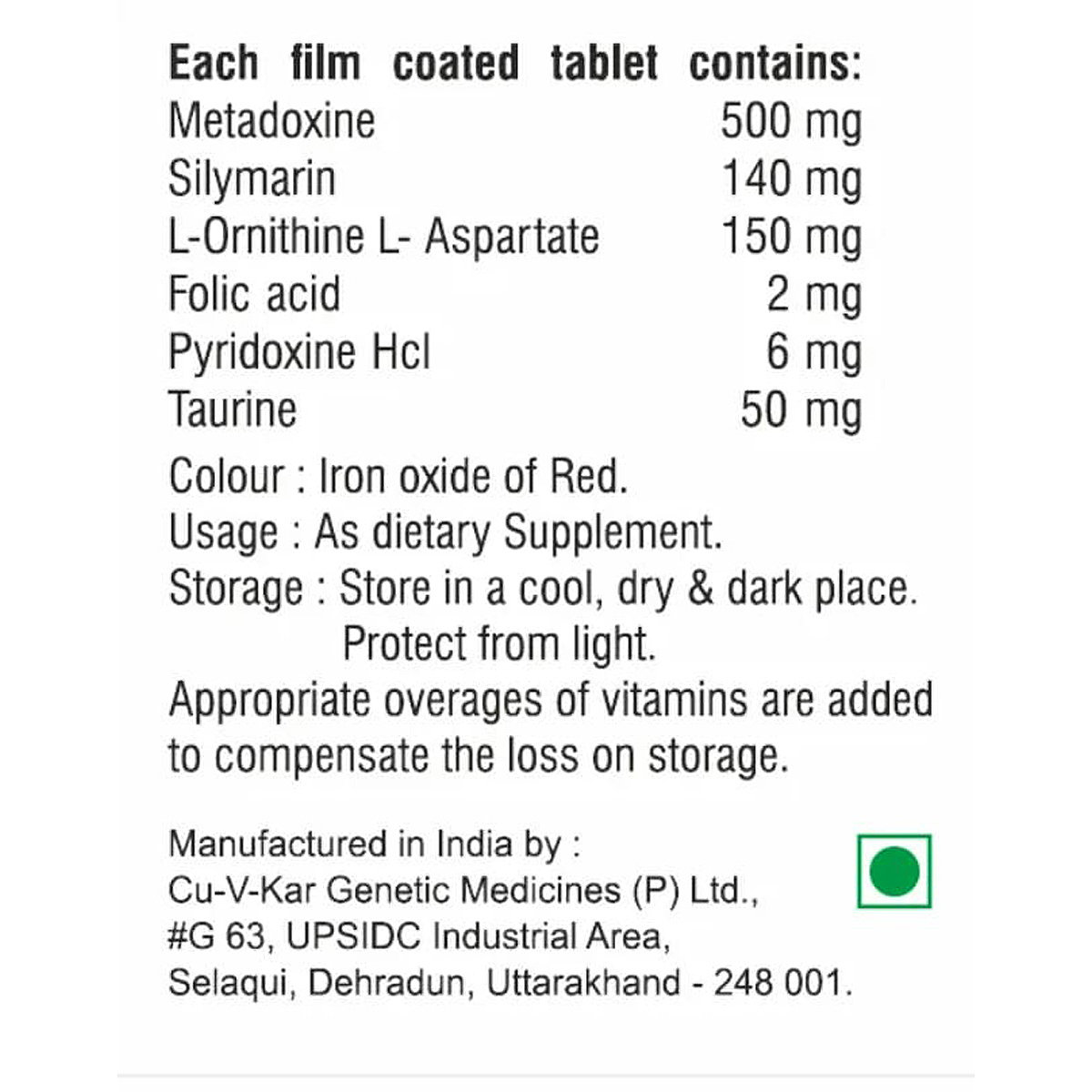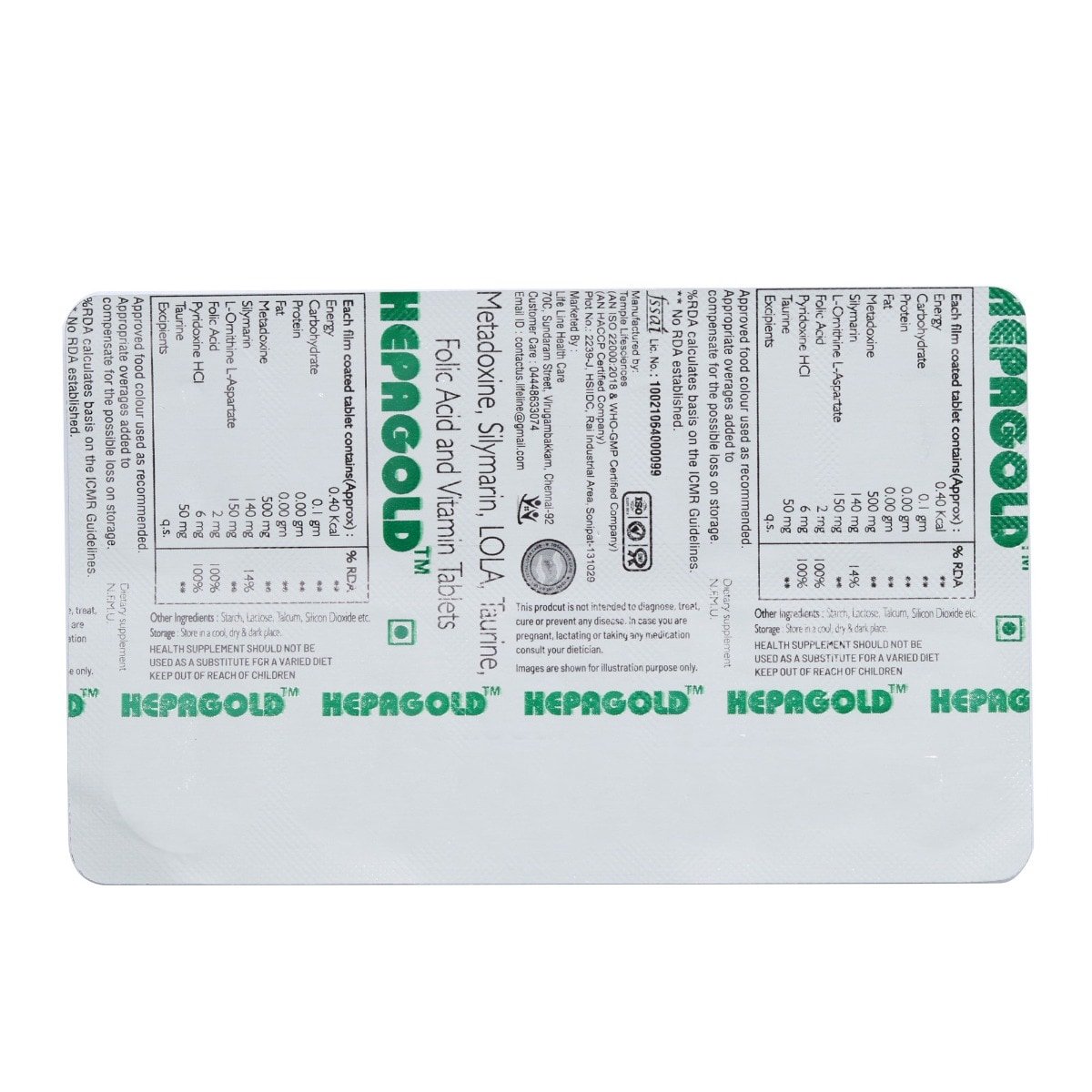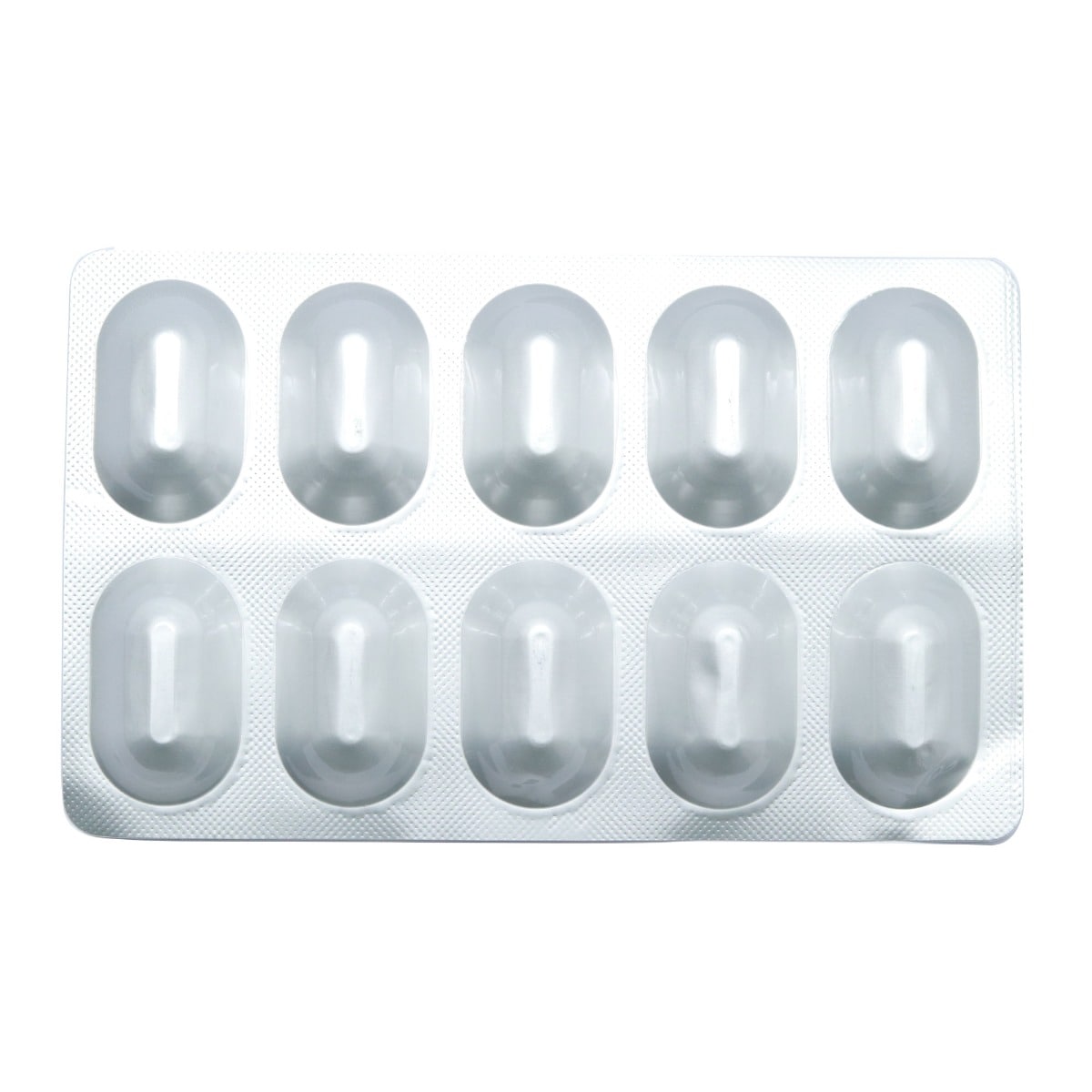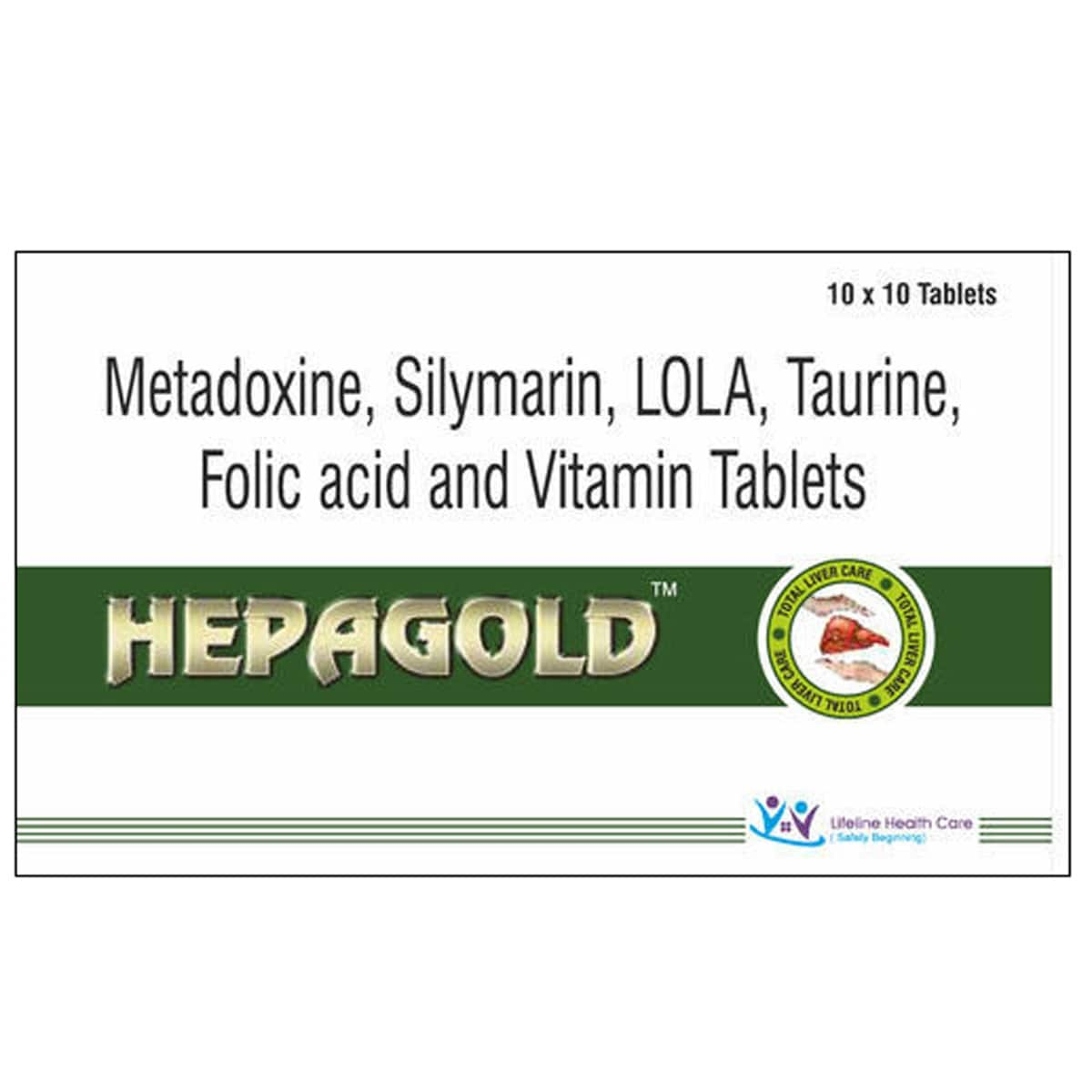Hepagold Tablet 10's
MRP ₹496
(Inclusive of all Taxes)
₹74.4 Cashback (15%)
Provide Delivery Location
Online payment accepted
 Prescription drug
Prescription drugWhats That
Manufacturer/Marketer :
Consume Type :
Expires on or after :
Return Policy :
About Hepagold Tablet
Hepagold Tablet is a combination medicine used to treat liver diseases such as acute and chronic hepatitis, chronic alcoholic liver damage, fatty liver, jaundice, liver cirrhosis, and non-alcoholic steatohepatitis (non-alcoholic fatty liver disease). Liver diseases lead to the disturbance of vital liver functions such as metabolism, detoxification of waste, and energy storage. Hepagold Tablet effectively prevents multiple mechanisms involved in liver diseases and ensures protection, regeneration, and rejuvenation of the liver.
Hepagold Tablet contains Metadoxine, Taurine, Silymarin, L-ornithine-L-aspartate, Folic acid, and Pyridoxine. Metadoxine restores the balance of saturated and unsaturated fatty acids in the liver by increasing the desaturase enzyme. Taurine helps in the production of bile salts, metabolism, and digestion. Silymarin helps in protecting the liver from free radical damage and prevents hepatic lipid peroxidation. L-ornithine-L-aspartate rejuvenates the liver by increasing the rate of energy production in liver cells. It decreases ammonia levels in the blood by increasing ammonia detoxification. Pyridoxine helps in the metabolism of dietary carbohydrates and fats in the liver. Folic acid helps in correcting micronutrient deficiency. Together, Hepagold Tablet helps in treating liver disease.
You are advised to take Hepagold Tablet for as long as your doctor has prescribed it for you, depending on your medical condition. In some cases, you may experience certain common side-effects such as headache, fatigue, diarrhoea, abdominal pain, and nausea. Most of these side effects do not require medical attention and will resolve gradually over time. However, you are advised to talk to your doctor if you experience these side effects persistently.
Let your doctor know if you are allergic to any of the contents in Hepagold Tablet . Consult your doctor if you are pregnant or breastfeeding. Avoid consuming alcohol with Hepagold Tablet as it could lead to further liver damage. Limited information is available regarding the usage of Hepagold Tablet in children; please consult your doctor. Inform your doctor regarding your health condition and the medicines you are taking to rule out any side effects/interactions.
Uses of Hepagold Tablet
Directions for Use
Key Benefits
Hepagold Tablet is a combination of six drugs, namely: Metadoxine, Taurine, Silymarin, L-ornithine-L-aspartate, Folic acid, and Pyridoxine. Hepagold Tablet is used to treat liver diseases such as acute and chronic hepatitis, chronic alcoholic liver damage, fatty liver, jaundice, liver cirrhosis, and non-alcoholic steatohepatitis (non-alcoholic fatty liver disease). Metadoxine restores the balance of saturated and unsaturated fatty acids in the liver by increasing the desaturase enzyme. It accelerates the metabolism of the liver, restores ATP synthesis and redox balance of hepatocytes. Silymarin helps in protecting the liver from free radical damage and prevents hepatic lipid peroxidation. It increases glutathione, protein synthesis and helps in the production of new liver cells. L-ornithine-L-aspartate rejuvenates the liver by increasing the rate of energy production in liver cells. It decreases ammonia levels in the blood by increasing ammonia detoxification. Pyridoxine helps in the metabolism of dietary carbohydrates and fats in the liver. Folic acid helps in correcting micronutrient deficiency. Taurine helps in the production of bile salts, metabolism and digestion. Together, Hepagold Tablet helps in treating liver disease. Hepagold Tablet effectively prevents multiple mechanisms involved in liver diseases and ensures protection, regeneration, and rejuvenation of the liver. Hepagold Tablet improves patient compliance and reduces the cost of therapy.
Storage
Drug Warnings
Do not take Hepagold Tablet if you are allergic to any of its components. Consult your doctor if you are pregnant or breastfeeding. Avoid consuming alcohol as it could lead to further liver damage. Limited information is available regarding the usage of Hepagold Tablet in children; please consult your doctor. Inform your doctor regarding your health condition and the medicines you are taking to rule out any side effects/interactions.
Diet & Lifestyle Advise
- Avoid alcohol consumption.
- Maintain a healthy weight by exercising regularly.
- Drink plenty of water.
- Adopt a liver-friendly diet such as fibre-rich food.
- Cut down on fats, sugar, and salt.
- Quit smoking.
- Avoid stress by practising yoga or meditation.
- Exercise regularly as it helps in reducing the accumulation of fat.
Side Effects of Hepagold Tablet
- Headache
- Fatigue
- Nausea
- Diarrhoea
- Abdominal pain
Habit Forming
Therapeutic Class
All Substitutes & Brand Comparisons
Author Details
We provide you with authentic, trustworthy and relevant information
FAQs
Drug-Drug Interactions Checker List
- LEVODOPA
Disease/Condition Glossary
Liver disease: The liver is an important organ that is responsible for carrying out many vital functions such as metabolism, detoxification of waste, and energy storage. Liver diseases occur due to disturbances in liver functions. Liver diseases include acute and chronic hepatitis, chronic alcoholic liver damage, fatty liver, jaundice, liver cirrhosis, and non-alcoholic steatohepatitis (non-alcoholic fatty liver disease). Hepatitis occurs due to viral infection leading to liver damage and inflammation, making it difficult for the liver to function properly. The fatty liver could occur due to excess consumption of alcohol (alcoholic fatty liver) or due to other factors (non-alcoholic fatty liver). Liver cirrhosis is damage of the liver, which causes scarring and liver failure. Jaundice occurs due to the build-up of bilirubin in the blood, which causes the yellowing of skin and eyes. Symptoms include yellowing of skin and eyes, dark urine, loss of appetite, fatigue, bloody or dark stools, nausea, and vomiting.

Have a query?
Alcohol
Safe if prescribed
Avoid consumption of alcohol while taking Hepagold Tablet as it may lead to further liver damage.
Pregnancy
Consult your doctor
Consult your doctor if you are pregnant or if you have any concerns regarding this; your doctor will prescribe only if the benefits outweigh the risks.
Breast Feeding
Consult your doctor
Consult your doctor if you are breastfeeding; your doctor will decide whether Hepagold Tablet can be taken by breastfeeding mothers or not.
Driving
Safe if prescribed
It is not known if Hepagold Tablet interferes with your ability to drive. Be cautious while driving or operating machinery.
Liver
Consult your doctor
Hepagold Tablet is used to treat various liver diseases. So, it is probably safe to be taken by patients with liver impairment. However, consult your doctor if you have any concerns.
Kidney
Consult your doctor
Please consult your doctor if you have any concerns regarding the usage of Hepagold Tablet in patients with kidney impairment.
Children
Safe if prescribed
Limited information is available regarding the usage of Hepagold Tablet in children. Please consult your doctor.
Recommended for a 30-day course: 3 Strips











_0.jpg?tr=q-85)

